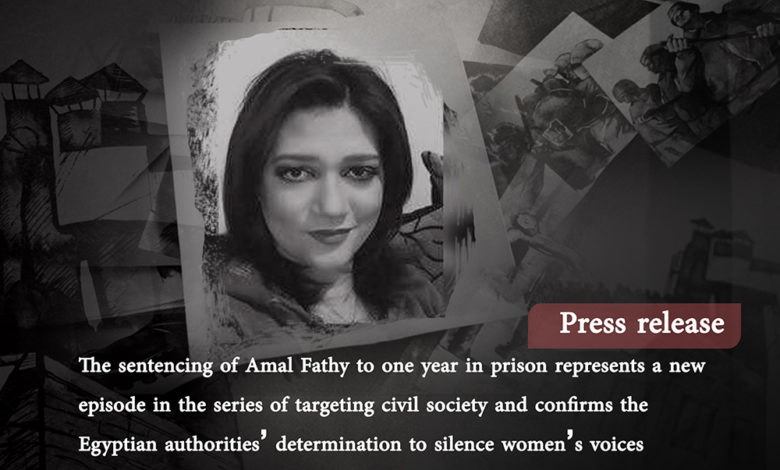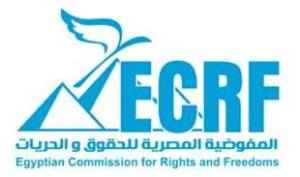The Egyptian Commission for Rights and Freedoms: The sentencing of Amal Fathy to one year in prison represents a new episode in the series of targeting civil society and confirms the Egyptian authorities’ determination to silence women’s voices
12 January 2022

The Egyptian Commission for Rights and Freedoms (ECRF) condemns the ruling of the Court of Cassation in case No. 7991 of 2018 – Maadi Misdemeanor, by upholding the conviction of Woman Human Rights Defender (WHRD), Amal Fathy, over her accusation of “the “spreading false news” and “possession of indecent material.” The conviction came in relation to a video statement that Fathy posted complaining about a sexual harassment incident she was subjected to in 2018.
ECRF stresses that punishing women simply for expressing the amount of suffering and psychological and physical harm they are subjected to on a daily basis due to crimes of sexual harassment, bears witness to the lack of sincerity of the Egyptian authorities in combating crimes of violence against women in Egypt.
It also denounces the persecution of women and the imposition of censorship on them and the content they post online or other means of expression, in an attempt to silence them and prevent them from expressing their feelings due to crimes of sexual harassment.
It also calls on the Egyptian government to create a safe environment for women instead of prosecuting them and preventing them from defending their right to a safe society.
ECRF stresses that the Court of Cassation ruling represents a new episode in the series of targeting civil society and human rights activists in Egypt and trying to silence independent voices exercising their right to promote, disseminate and defend human rights protected under international law and the Egyptian constitution.
Amal Fathy is a human rights activist and defender, who was awarded the Bruno Kreisky Prize in 2019 for her courageous work in defence of human rights and condemnation of violence against women in Egypt.
Security authorities had arrested Amal Fathy on May 11, 2018, and taken into custody her husband, human rights defender and executive director of the Egyptian Commission for Rights and Freedoms, Mohamed Lotfy, and their child, Zeidan. She faced charges of “spreading false news”, “possessing immoral materials” and “insulting” in Maadi Misdemeanor No. 7991 of 2018.
This came against the background of Amal publishing a video clip on her personal page on Facebook, in which she told her testimony about the incidents of sexual harassment she was subjected to earlier the same month, in addition to her condemnation of crimes of violence against women in Egypt.
On September 29, 2018, the Maadi Misdemeanor Court sentenced her to two years in prison and a fine of 10,000 pounds. On December 30, 2018, the Court of Appeal upheld the ruling without amendments. Then, the Court of Cassation began examining the appeal against the ruling in February 2021 until the hearing of the decision.
Amal spent nearly 6 months in arbitrary pretrial detention in conjunction with the progress of the first case, on charges including “spreading false news” and “belonging to a terrorist group” in Emergency Supreme State Security Case No. 621 of 2018. She also suffered severe deterioration in her health as a result of the harsh conditions of imprisonment.
ECRF reminds the Egyptian authorities of their constitutional and international obligations to respect and protect the right to freedom of expression under Article 65 of the Egyptian Constitution of 2014, and Article 19 of the International Covenant on Civil and Political Rights of 1966. It also stresses the need for Egyptian authorities to fulfill their international obligations towards eliminating all forms of discrimination and violence against women, including combating crimes of sexual harassment, and protecting women who express their experiences in the manner they see fit.





